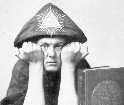

|
Introduction to Crowley |
| web collection · essays · journal · about the author · send me e-mail |
Crowley's doctrine of truth and falsehood is easily misunderstood. It recurs often in his system and is the central theme of his well-liked poetic book of Qabala, the Book of Lies. Contradiction to Crowley was not a problem but a sign of a higher mystical understanding transcending the rational. Ordinary understanding is held to be inadequate to engage Truth and in fact it is thought to be in the way. A standard preparation for the Ordeal of the Abyss is to constantly multiply contradictions in one's mind, each thought contradicting the previous, until the trance known in yoga as samadhi is attained. Every fixed idea is shown to be partial and false, including ideas about the self, until finally the tyrannical usurper Reason is dethroned and the True Will comes to take its place.
When considering issues of Crowley's apparent literalism there is always the question of how literally he expected his statements to be taken. He demanded allegiance to certain ideas but also insisted that every idea must be doubted. To many Thelemites Crowley's declarative statements are literal truth as well as higher spiritual Truth. To other readers, Crowley was almost always joking and the reader should always be looking for the joke.
In the secret societies studied by anthropologists truth is relative to initiatory degree. The truth of a higher initiate is incomprehensible to one of lower degree, while the truth of lower degrees is understood to be false by the higher. There are elements of this idea in Thelema as well.
One interpretation holds that Thelema contains a higher and lower cultus. In this model the outer orders and lower degrees are targeted at people who are not yet Thelemites in themselves, so they are attracted by a devotional religion with traditional trappings and set dogmas. At some level these people will see through these trappings to the mystical Truth, as Crowley intended them to do, and at that point they might or might not continue to hold a literal belief in any part of the system. In this interpretation it might be considered rude to interrupt the natural development through the devotional or literalistic stage as the Skeptic voice seems to be doing.
The Literalist might say this: The Law of Liberty is the Charter of Universal Freedom and the sole rule and guide of life in this Æon. It is Truth on every level. While all mundane truth is false in a sense, still there is the level of ordinary human reality with its pragmatic rule of truth by which people can agree on whether it is raining outside or whether the grocery store is open or closed. The Law of Thelema and the Æon of Horus are inspired mystical Truths emanating from the Third Order of A.·. A.·. but they are also natural Laws and pragmatic human facts. There is a definite Current of planetary Energy flowing from the Third Order against which it would be foolish and self-defeating to struggle. It is the Will of All to align themselves with this Current.
The Chaotic might say this: Crowley was an early shock trooper in the ontological guerrilla warfare waged by people like Brion Gysin, A. O. Spare, William Burroughs, Timothy Leary, Peter Carroll, and Robert Anton Wilson. He wasn't afraid to directly assault traditional value systems; he demonstrated the limits of logic; he explored the distant cognitive frontier; and he insisted on individual thought instead of dogma. He could sometimes forget his own principles but that's part of the process too. At least he kept his sense of humor!
The Skeptic might say this: Crowley's negative view of intellect is comparable with Blake's view of Newton and Urizen. If we accept that Crowley was in spirit a nominalist and freethinker then it becomes possible to think of him as one of the highly differentiated points on the existentialist spectrum, perhaps a kind of occult Kierkegaard. Other existentialists also dedicated much of their work to the reclamation and validation of denied or underworld feelings. In this respect existentialists are related to the decadent poets, of which Crowley was a late example. He might deserve more study than he has gotten as a literary contributor but he does not hold up as a philosophical contributor -- he was a sloppy thinker, and he often allowed his doctrine of contradictions to degenerate into a mere excuse for representing contradictions as paradoxes.
The Mystic might say this: Truth and falsehood as applied by the intellect are uniformly false judgments when viewed from the higher perspective afforded from the three supernal Spheres of the Tree of Life. Real Truth is only known to the Master of the Temple, the passive, observing, meditative Self first assumed by the Babe of the Abyss who is born after the fall of Reason. Truth can only be spoken by the Magus, whose development and grade follows the Master of the Temple, but He is cursed to have His Word turn into falsehood whenever it is heard. This Truth is beyond any possible description in words but could be indicated as the Understanding of the perfect integrity of the fabric of the personal psyche and the world that it creates.